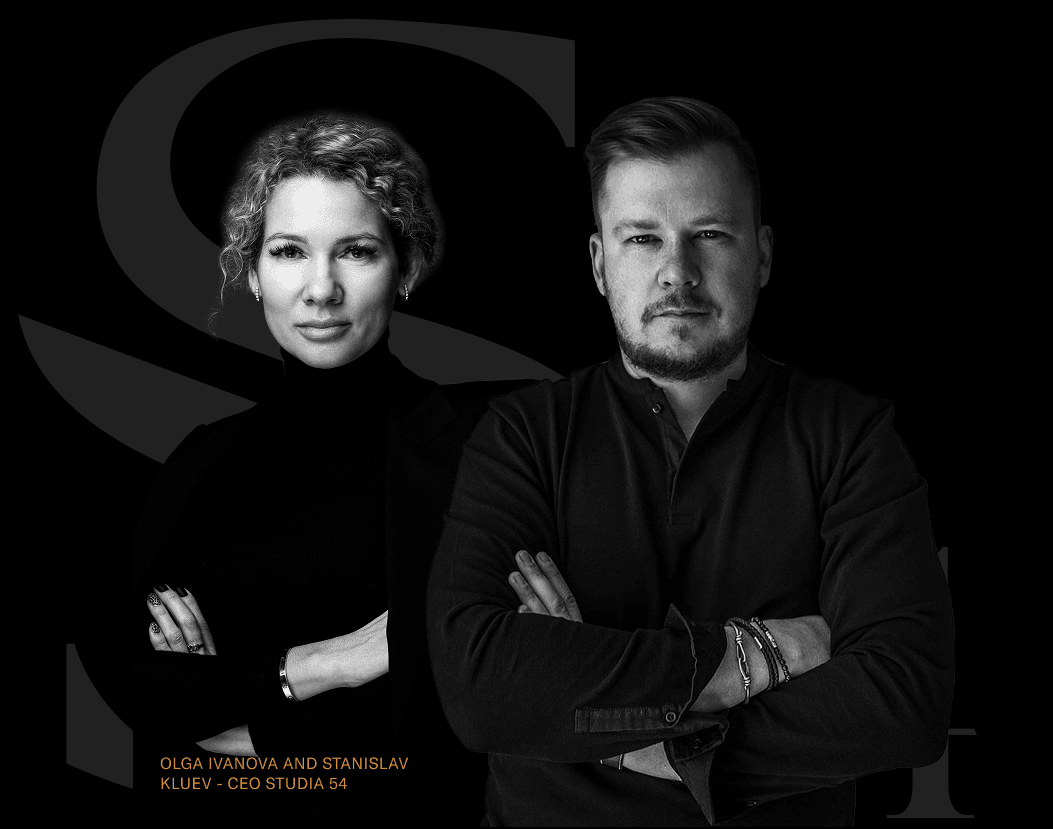/ Interior
~ 6 min
Published: 28/10/202
We have noticed a growing interest among clients in dark color palettes — and we must admit, this is our favorite choice. Deep, rich shades have become the preference of those who strive for refined aesthetics.
Despite our extensive experience in creating dark-toned interiors, Studia 54’s style has become recognizable worldwide for many other reasons. Different concepts, colors, locations, and the dreams of our clients — all our projects share one thing in common: a high level of detail and an atmosphere of comfort combined with the luxury of a five-star hotel. For each project, we select an individual color scheme and create original sketches of art objects and lighting installations.
The psychology of a dark color palette
Dark colors are rich and expressive — they create a sense of depth and make an interior look sophisticated. There is a common myth that dark interiors make spaces feel smaller, and with poor planning this can indeed happen. In the hands of the Studia 54 team, however, a dark interior visually expands the space and softens its boundaries.
Color psychology plays a key role in interior design, as dark shades are often associated with luxury, elegance, and a touch of mystery. Deep blue, rich green, graphite, and dark brown tones can evoke feelings of calm and comfort.
In fact, the secret is simple: the key to a successful dark interior lies in achieving the perfect balance of colors.
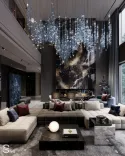
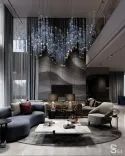
Dark-toned interiors by Studia 54
Living room in mocha mousse shades
The Studia 54 team loves to work with contrast in interior design. In our view, one of the most striking and on-trend combinations is dark gold paired with graphite, chocolate, and mocha mousse tones.
In this season’s design project, we applied our signature techniques for working with dark color palettes. Above the soft sofa area, we placed a mirrored portal and an accent lighting installation. The reflective portal helps to zone the space while visually expanding it. With five-meter-high ceilings, this solution makes the room feel even taller.
A layered lighting scenario is created through the combination of a bio fireplace, built-in illumination, the central installation, and a sculptural floor lamp reminiscent of a mushroom tree.
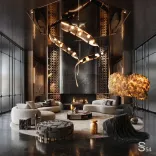
Dark bedroom
Our project in the Czech Republic has become one of the favorites among our audience — it stands out with numerous accent details, sculptural elements, and subtle ethnic motifs. The client requested a bold, masculine interior without excessive opulence.
In the master bedroom, a large marble partition with asymmetric milling divides the space into functional zones while preventing any feeling of confinement. On the reverse side, we created a composition of frosted glass with soft backlighting and added a black macramé wall panel. A console by FiftyFourms, crafted from genuine leather and soft suede, fits perfectly into this setting — a vivid example of texture diversity.
The bed, designed from our original sketches, features an oversized velour headboard positioned against the partition wall.
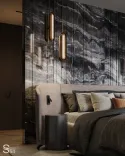
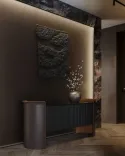
Bathroom in dark tones
You may have noticed that dark bathrooms often appear in our projects — they always look striking and are a timeless way to impress guests.
For example, in our project in Vietnam, both guest bathrooms are designed in deep, dark shades, while the master bathroom is light green — the client’s favorite color.
For one of the guest bathrooms, we selected an onyx sink with integrated lighting that gently illuminates the stone from within. The window is dressed with a dense velour curtain, preserving the intimate atmosphere of a private salon. The brass-framed mirror was designed with a removable structure, allowing the window to be easily opened for maintenance. However, the true centerpiece of the space is a lighting installation with shimmering crystal pendants resembling burgundy calla lilies.
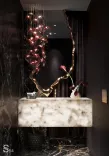
Ways to create color balance in interior design
Step 1. Colorful accents
To avoid a sense of enclosure, color accents are used to create expressive contrast — for example, white furniture, a light rug, or metallic details. Brass elements add highlights and a touch of warmth to a dark-toned interior.
Step 2. Variety of textures
Glossy finishes on dark surfaces reflect light, adding movement and dynamism to the space, while matte textures absorb it, creating a softer and more restrained appearance.
Luxurious fabrics such as velvet, velour, bouclé, and silk bring a sense of sophistication, while natural materials — marble and fine wood veneer — with their varying reliefs, offer tactile appeal. We apply different techniques to achieve a high level of detailing: leather inlays, precision milling, and galvanic patterns developed from our team’s original sketches.
Through this diversity of textures, the interior gains depth and a multi-dimensional aesthetic.
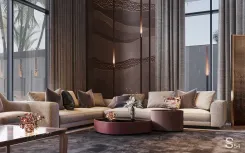
Step 3. Layered lighting
Proper lighting not only highlights the beauty of dark tones but also brings warmth to the space, preventing any sense of confinement. You can read more about lighting design in interiors in this article.
A layered lighting system includes:
- Ambient lighting that creates a soft, diffused background.
- Accent lighting for niches, furniture, and stair steps, visually altering the geometry of the space.
- Task lighting for functional areas.
- Additional lighting scenarios using dimmers.
Dimmer switches are essential in dark-toned interiors, as they allow the brightness level to be adjusted throughout the day, adapting to different life scenarios. This flexibility enhances functionality and helps create the right atmosphere for various occasions.
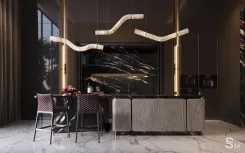
Step 4. Reflective surfaces
The placement of mirrors and reflective finishes creates additional perspectives and visually enlarges the space. Mirrors positioned in well-lit areas act as secondary light sources, while glossy furniture and décor surfaces form a sophisticated optical composition.
Mirrors help compensate for light absorption and maintain a balance between the richness of dark tones and a sense of airiness.
Dark interiors continue to captivate those who appreciate refined aesthetics. They evoke a sense of luxury, privacy, and seclusion.
Dark interiors in the Studia 54 style challenge traditional perceptions of space, proving that layered lighting and carefully planned accents can create an atmosphere that is both calming and inspiring.
A selection of Studia 54 projects in dark tones
- Luxury interior design project of a residence in Repino
- Unique interior design of a villa in the Philippines
- A villa project with a hand-painted dome in Goa, India
- Villa interior at Sobha Hartland in Dubai
- Modern interior of the house in dark shades in Prague






